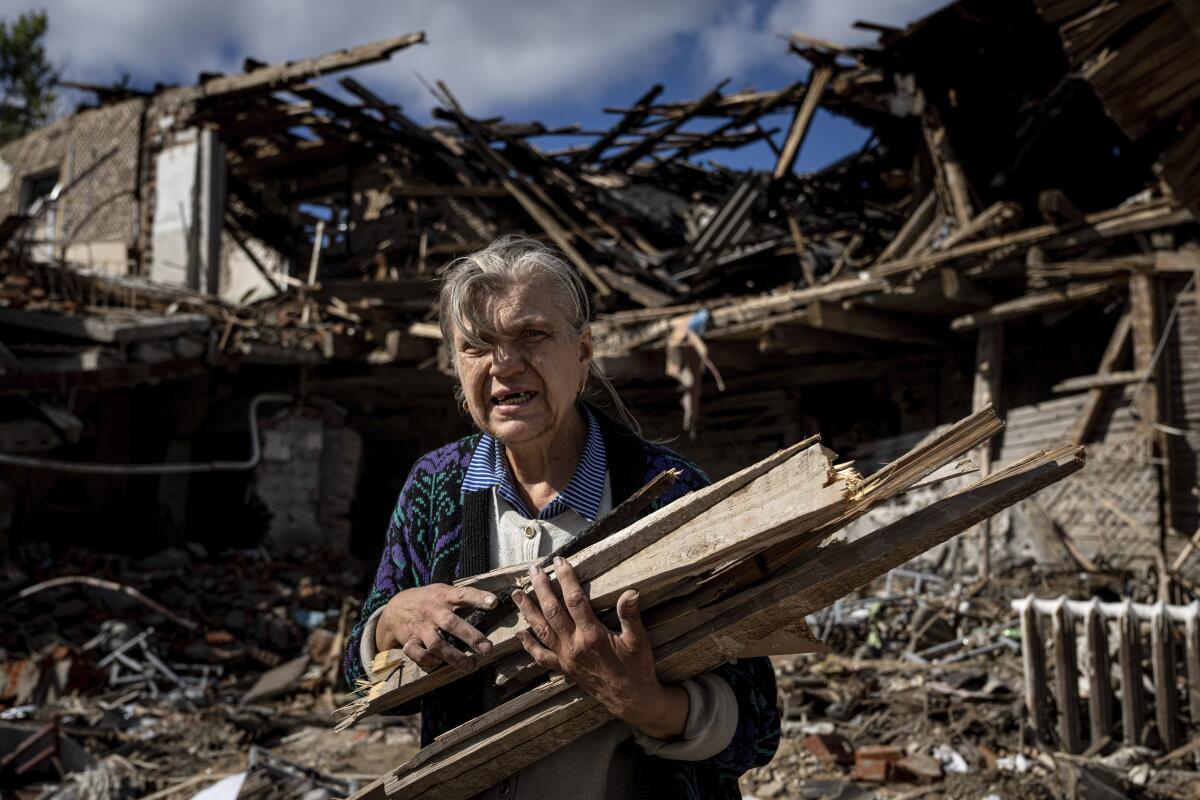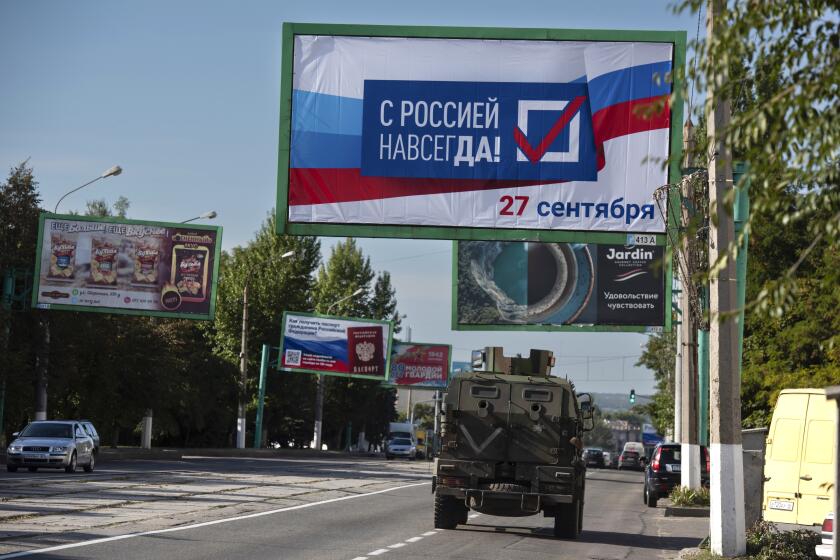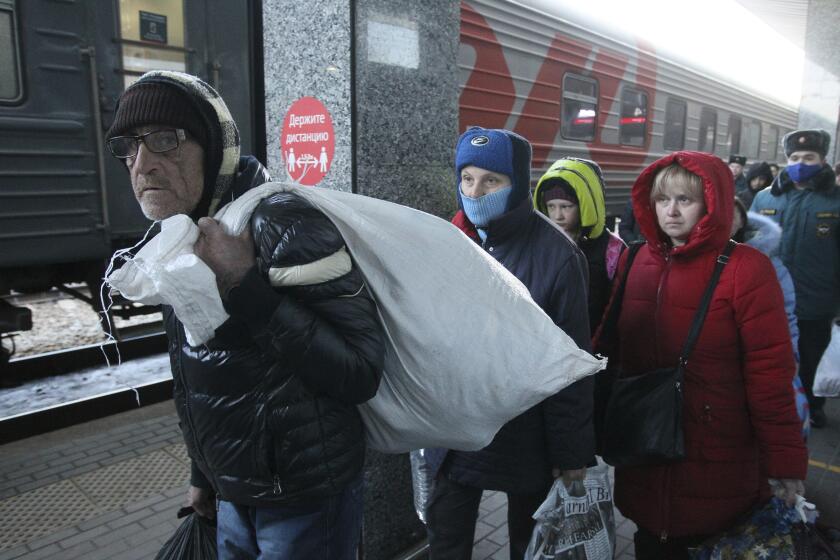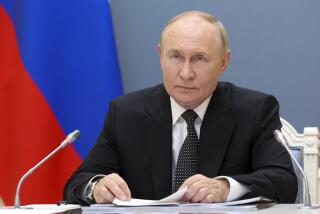U.N. rights experts cite signs of Russian war crimes in Ukraine

GENEVA ‚ÄĒ A team of experts commissioned by the United Nations‚Äô top human rights body to look into rights violations in Ukraine said Friday that its initial investigation turned up evidence of war crimes in the country following Russia‚Äôs invasion nearly seven months ago.
The experts from the Commission of Inquiry on Ukraine, set up by the U.N.’s Human Rights Council this year, have so far focused on four regions: Kyiv, Chernihiv, Kharkiv and Sumy.
Presenting their most extensive findings so far, they cited testimonies by former detainees of beatings, electric shocks and forced nudity in Russian detention
facilities, and expressed grave concerns about executions.
‚ÄúBased on the evidence gathered by the commission, it has concluded that war crimes have been committed in Ukraine,‚ÄĚ Erik Mose, the commission‚Äôs chairman, told the Human Rights Council.
Commission member Pablo de Greiff told reporters that the team had ‚Äúfound two instances of ill-treatment of Russian Federation soldiers by Ukrainian soldiers. ... We have found obviously significantly larger numbers of incidences that amount to war crimes on the part of the Russian Federation.‚ÄĚ
During a 10-day June trip to Ukraine, the team visited Bucha, a city outside the capital, Kyiv, where Ukrainian authorities found mass graves and bodies strewn in the streets after Russian forces pulled out in late March.
The referendums in four occupied regions of Ukraine on whether to become part of Russia could result in an escalation of the seven-month-old war.
The findings echo reports by news outlets and others of the destruction, death and despair in Ukraine since Russian President Vladimir Putin ordered the invasion Feb. 24.
The commission’s findings could ultimately contribute to the work of International Criminal Court prosecutors, who could bring charges over war crimes in Ukraine, although it remains uncertain whether Russia or other alleged perpetrators will ever face justice.
Anton Korynevych, the ambassador-at-large for Ukraine’s Foreign Ministry, joined envoys from a number of Western countries who spoke out against the war after the commission’s presentation. Russia’s delegation did not attend the council meeting.
Korynevych, speaking by video, called for the creation of a special tribunal that would have jurisdiction ‚Äúover the crime of aggression against Ukraine‚ÄĚ and investigate senior Russian political and military leaders who were responsible.
Nearly 2 million Ukrainians refugees have been sent to Russia. Their journey starts not with a gun to the head, but with a poisoned choice: Die in Ukraine or live in Russia.
He said accountability was crucial for rights violations and atrocities linked to Russia‚Äôs ‚Äúaggression‚ÄĚ but also highlighted how the effects of the war had rippled through the world and ‚Äúput numerous countries on the verge of hunger, exacerbated extreme poverty, created the threat of nuclear catastrophe unseen before‚ÄĚ and harmed the livelihoods of millions worldwide.
The commission’s investigators visited 27 towns and settlements, as well as graves and detention and torture centers; interviewed more than 150 victims and witnesses; and met with
advocacy groups and government officials, Mose said.
Mose said an unspecified number of Russian soldiers were found to have committed crimes of sexual or gender-based violence, with victims ranging in age from 4 to 82 years old.
The commission plans to gradually expand its investigation to include areas of interest such as allegations of filtration camps for people being detained or deported, the forced transfer of people and the expedited adoption of children.
News Alerts
Get breaking news, investigations, analysis and more signature journalism from the Los Angeles Times in your inbox.
You may occasionally receive promotional content from the Los Angeles Times.
‚ÄúThe evidence of Russia‚Äôs atrocities becomes more horrifying by the day, most recently with the uncovering of mass graves in Izyum, where the bodies show signs of torture,‚ÄĚ Michele Taylor, the U.S. ambassador to the Human Rights Council, said, referring to a city in the Kharkiv region that Ukrainian forces recaptured in recent weeks.
Taylor urged the commissioners to continue to ‚Äúexamine the growing evidence of Russia‚Äôs filtration operations, forced deportations and disappearances.‚ÄĚ
She referred to ‚Äúnumerous sources‚ÄĚ that indicated Russian authorities had interrogated, detained and/or forcibly deported 900,000 to 1.6 million Ukrainian citizens, and reports that children were being deported from Ukraine and placed in Russian orphanages for adoption.
A few of Russia’s allies took to the defense of Moscow.
Ina Vasileuskaya, the deputy permanent representative of Belarus to the U.N. in Geneva, said Russia’s invasion aim was to protect Russian speakers in Ukraine.
‚ÄúBiased discussions in the Human Rights Council only accusing Russia are a dead end,‚ÄĚ she said.
Vasileuskaya said her country was not a party to the conflict, although Belarus was one of the places where Russian forces gathered before invading Ukraine.
More to Read
Sign up for Essential California
The most important California stories and recommendations in your inbox every morning.
You may occasionally receive promotional content from the Los Angeles Times.












